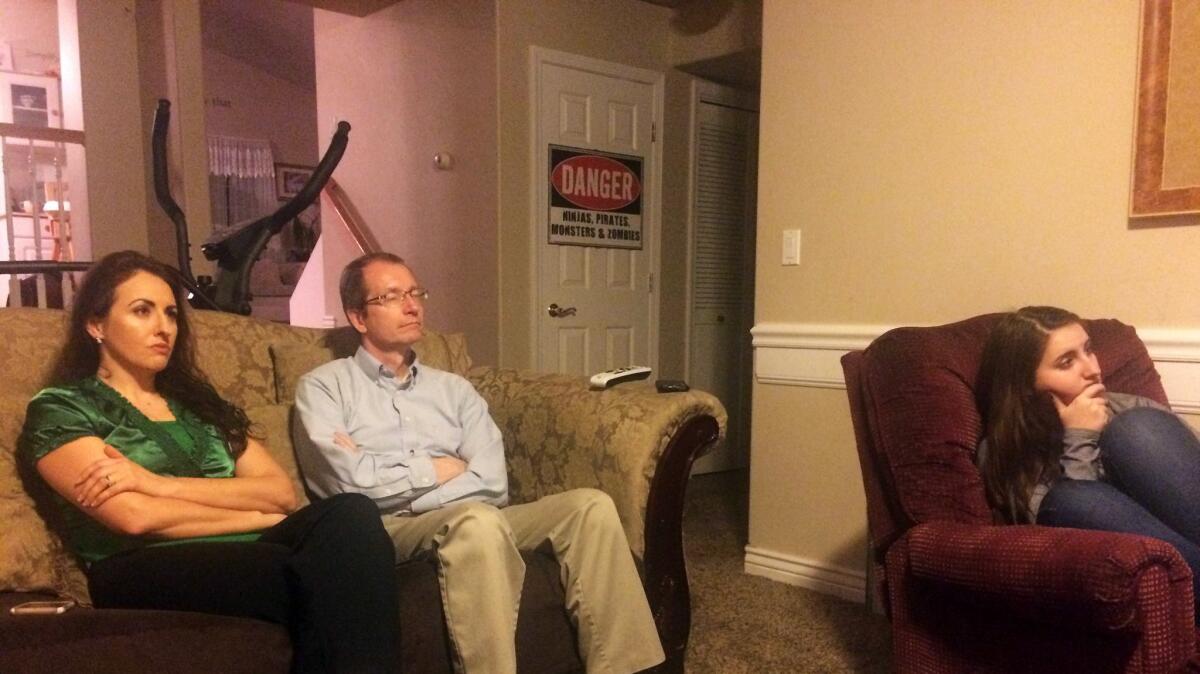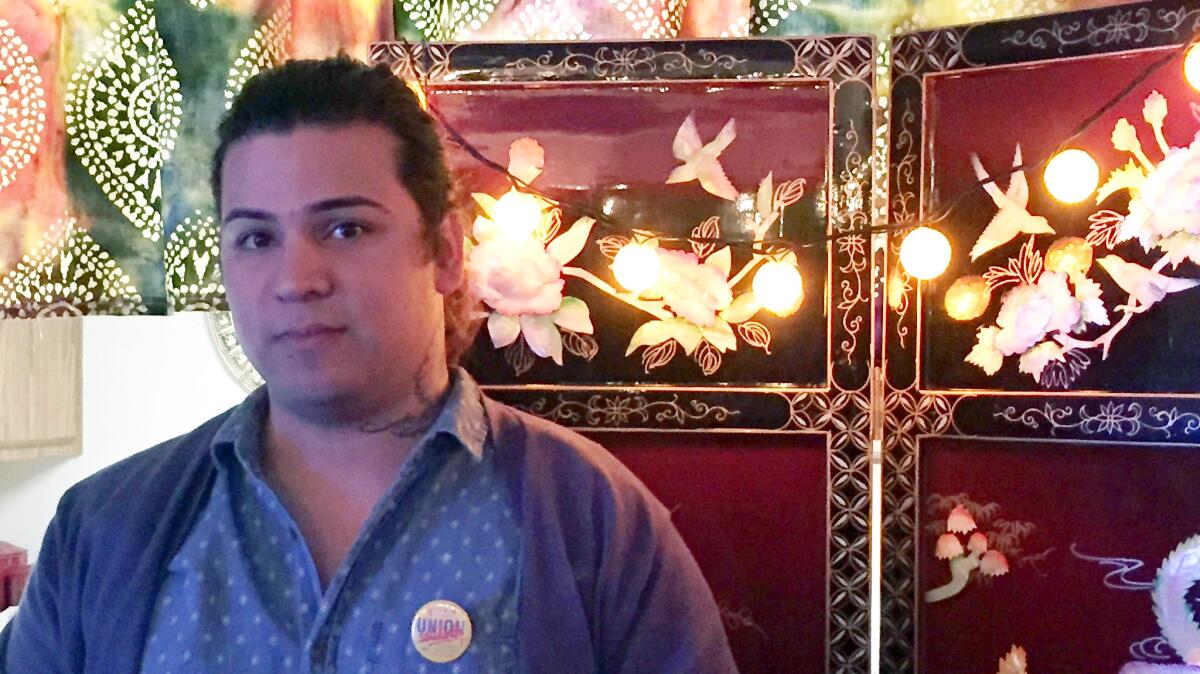Red America and blue America saw two very different Trump speeches

In President Trump’s first speech to Congress, he acknowledged the widow of Navy Seal William Ryan Owens. (March 1, 2017)
Reporting from Meridian, Idaho — Early in his speech to Congress, when President Trump likened his election to a political earthquake, it practically lifted Kristen Rossow off her couch.
Sitting in the family room of her split-level home in this tidy Boise suburb, watching with her husband and daughter — all Trump fans — she sprang up and raised two fists to the ceiling.
“Yes!” she exulted with a broad smile at the pinch-me moment. “This is seriously a miracle!”
In Las Vegas, Jose Venturi watched with arms crossed Tuesday night, sunk into his orange sofa, as if shielding himself from the words coming from his television set.
He doesn’t like Trump. He certainly didn’t vote for the man, and as the president spoke of energy building and his supporters rising up and the ground moving in a great electoral shock wave, he watched impassively.
No expression. No sound.
Just resignation.
Annotated transcript: President Trump’s address to a joint session of Congress »
Trump spoke to the country for 60 minutes Tuesday night, delivering roughly 5,000 words and offering a vision that seemed starkly different — inspiring to some, frightful to others — depending on what they heard.
No speech could bridge the chasm in a nation so deeply split, or bind the wounds after an election so highly contentious, or come even close to satisfying its entire audience.
But seen with opposing partisans, heard through their ears and filtered through their perspectives, the shared moment only underscored the country’s yawning political gap and lack of commonality.

For Rossow, 39, a small business owner and mother of five children, there was little not to like.
Trump spoke boldly, she said, delivering the kind of cut-through-the-bull clarity and purpose that attracted Rossow to his candidacy in the first place. She laughed out loud when he talked about NATO members finally paying a fair share for their military defense, crowing, “The money is pouring in. Very nice!”
“It’s a perfect example of him taking an issue, using his experience and boldness and resolving it,” she said, though, as fact-checkers later pointed out, the increases began before Trump took office. “And that’s what gets me so excited. That’s the kind of person we need in there right now.”
For Venturi, 26, a kitchen worker at a resort hotel on the Las Vegas Strip, the speech sadly confirmed what he has come to see: The president is always picking on people.
Trump’s rhetoric — about building a wall along the U.S.-Mexico border and blaming job losses on immigrants in the country illegally — made him feel isolated and not American, Venturi said, even though he was born in La Mirada in Southern California.
“Trump says he wants everyone to fulfill the dream and live up to what they want to be,” Venturi said in his small apartment, cast in the glare of nearby casino lights. “I think it should be for all American people.”
More than just 600 miles separate Las Vegas and Meridian.
Idaho is staunchly Republican, with one of the smallest minority populations in the country and little in the way of an organized labor movement. Trump carried the state by nearly 30 percentage points over Hillary Clinton; Idaho hasn’t backed a Democrat for president since Lyndon Johnson in 1964.
Its southern neighbor, Nevada, reflects the demographic and political changes remaking the West, with a large and booming Latino population and increasingly Democratic tilt.
Clinton edged Trump with 48% support, for the party’s third straight presidential victory in the state; in Clark County, where Venturi lives and the culinary union is a political powerhouse, she won by 10 percentage points.
Venturi, a loyal union member, voted for Clinton and, naturally, was disappointed when she lost.
For much of Trump’s speech, he sat quietly, his face a mask. His cat, Manson (as in Marilyn), slunk around the hallway of the two-bedroom apartment, and five goldfish darted back and forth in a large tank in the dimly lit room, which evoked a rural ’60s shabby chic.
Then Trump laid waste to the Affordable Care Act, calling the national healthcare law an imploding disaster. Afterward, he pointed to a 20-year-old woman in the gallery, whose father developed a drug to save her life from a rare disease.
“An incredible young woman is with us this evening who should serve as an inspiration to us all,” Trump said.
Venturi leaned forward. His eyes narrowed. The moment made him think of his sister, Samantha, who died at 16 of a rare brain disease. He had a small pacifier tattooed on his upper body as a remembrance.
His family couldn’t afford the doctor visits or medicine needed to keep Samantha alive. Oklahoma, where the family was living at the time, rejected the federal funds available under the Affordable Care Act.
“Her insides were rotting,” Venturi said, his voice soft and reflective. “It was really bad. She was suffering so much at the end.”

With no evident replacement plan for those needing healthcare insurance, Venturi worries Trump is leaving people like his sister behind, though he tried to stay optimistic. “I really do hope he helps people out,” he said.
For Rossow, the prospect of ending Obamacare is a godsend.
“Oh, brother,” she said as Trump delivered his attack and Republicans in the House chamber rose to their feet in support. “They have no idea how horrible it’s been.”
The family’s insurance bill climbed 15% last year, with the prospect of more increases to come. Others Rossow knows are struggling to keep their medical coverage, or face mountainous costs.
It’s not that she lacks empathy; one of the things she likes about Trump is that he promised to fix, not just repeal, the Affordable Care Act, which suggests to her both reasonableness and compassion. Rossow figures there has to be a better way.
Unlike others who came around to the president through a grudging process of elimination, she backed the former Manhattan real estate magnate from the start of his long-shot candidacy.
Rossow, who operates a business running beauty pageants, appreciated Trump’s corporate background. She liked his status as a Washington outsider, unbeholden to entrenched interest groups.
Far from raising alarms, the more his opponents attacked him and the media piled on, the better Trump looked.
“When people called him a bigot and a racist, he said, ‘I don’t care, I’ll say what I believe based on principle,’” Rossow said with admiration. “He was the only one with the courage to take on the media and the corruption in Washington.”
She heard that fearlessness threaded throughout Tuesday night’s speech, along with a lot of common sense.
It makes sense to end trade deals that hurt American workers, she said. It make sense to protect the country’s borders and keep out immigrants who wish to harm the United States.
Not every Muslim, her daughter, 16-year-old Anna, asked. “No,” Rossow replied.
If there was one concern, it was the evident lack of enthusiasm among Democrats in the congressional chamber.
“They’re not standing,” Anna said, during one of many times Republicans leaped to their feet, while stock-still Democrats remained seated in the usual tableau of partisan protest.
“They’re not even clapping,” her mother added.
“I’m really surprised there’s not more unity,” Rossow said moments later. “I really wish they could see the good he’s doing.”
But that was a small disappointment. Rossow’s big smile and enthusiasm filled the family room, with its books and toys and passel of stuffed animals. Even after an hour, it seemed she couldn’t get enough of the new president. Her president.
But Venturi was quite finished. As soon as the speech ended, the YouTube stream faded to a blue screen.
The graveyard shift awaited; he had to get ready for work.
[email protected] | @markzbarabak
[email protected] | @davemontero
Barabak reported from Meridian, Idaho, and Montero from Las Vegas.
ALSO
President Trump’s speech to Congress: A big shift in tone, but tough choices left to Congress
Annotated transcript: President Trump’s address to a joint session of Congress
The real goal of Trump’s executive orders: Reduce the number of immigrants in the U.S.
More to Read
Get the L.A. Times Politics newsletter
Deeply reported insights into legislation, politics and policy from Sacramento, Washington and beyond. In your inbox three times per week.
You may occasionally receive promotional content from the Los Angeles Times.












